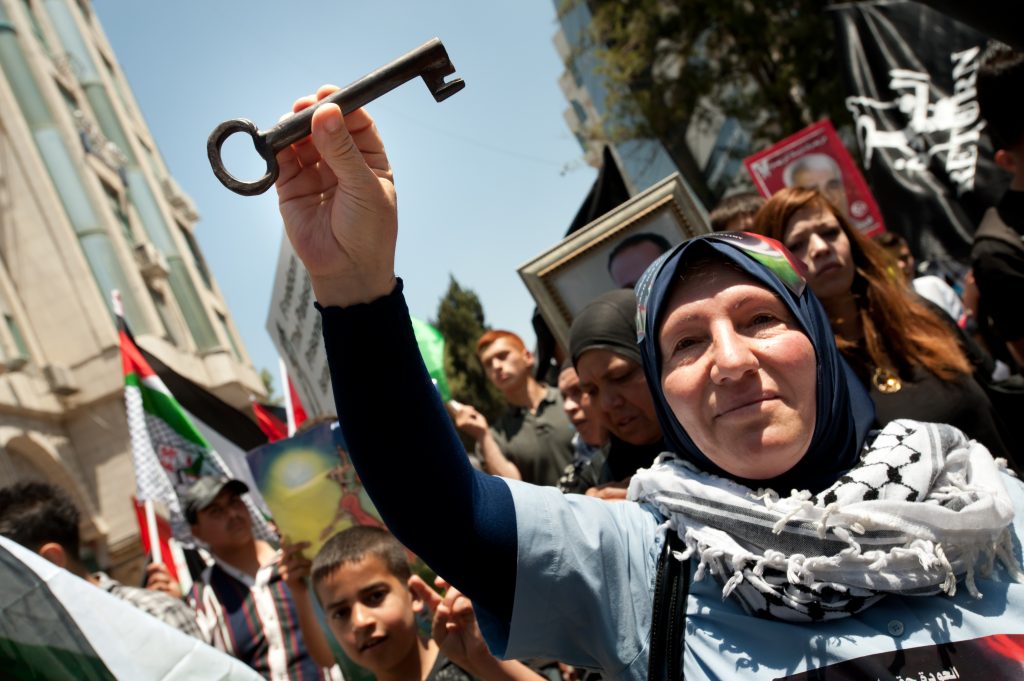Australia/Israel Review
The problem with “Nakba day”
May 30, 2022 | Bassem Eid

Who in the Middle East has not been traumatised by the upheavals of the last century? All of us celebrate the history of our families and treasure the places where we have lived, yet only the Palestinian leadership has weaponised the memory of displacement and transformed it into an ideology of genocide.
“Nakba Day,” which occurs every year on May 15, was established in 1998 by former Palestinian Authority President – and international terrorist mastermind – Yasser Arafat, to turn Israel’s Independence Day into a festival of grievance. The very fact of Israel’s existence was branded a “catastrophe” – Nakba in Arabic – but not the displacement that affected both sides in the subsequent war, which included the ethnic cleansing of all Jews from what became the West Bank and eastern Jerusalem. And during and after Israel’s War of Independence in 1948, hundreds of thousands of Jews were expelled from Arab lands; that is, in fact, the true nakba.
In the war in what had been British Mandatory Palestine, Jewish communities were uprooted and expelled from their homes in Gush Etzion and Atarot in the modern-day West Bank by the British-commanded Transjordanian Arab Legion. The ancient Jewish community of Hebron, where the Cave of the Patriarchs – burial site of the biblical forefathers Abraham, Isaac and Jacob – is located, had already been pushed out by a 1929 Arab riot and prevented from returning by the British authorities.
Baghdad was one-third Jewish in the early 20th century, and like the Temple Mount today, there were many sites there that were shared by both Jewish and Muslim worshippers, such as the Prophet Ezekiel’s Tomb in al-Kifl, home for centuries to both a mosque and a synagogue.
In 1941, during the brief Nazi-backed coup led by Rashid Ali al-Gailani, an antisemitic mob was allowed to murder and rape members of Baghdad’s Jewish community in a pogrom called the Farhud. Iraq also persecuted its Jewish community after Israel’s independence and, by 1951, Israel had rescued by airlift almost the entire Iraqi Jewish population in “Operation Ezra and Nehemiah”.
The Jewish community in Yemen was also rescued by the embryonic Jewish state in 1948-49, within a year of Israel’s independence, in “Operation Wings of Eagles”. According to legend, many Yemenite Jews had never even seen an aeroplane before and took them as a literal fulfillment of the biblical promise that “they that wait for the Lord … shall mount up with wings as eagles” (Isaiah 40:31).
In all, more than 850,000 Jews were forced to flee Arab countries for Israel, followed by more than 70,000 Jews from Iran after the 1979 Islamic Revolution. Like Iraq, Iran was home to multi-confessional sites honoured by both faiths, such as Queen Esther’s Tomb in Hamadan, Iran. On “Nakba Day” 2020, a vandal set parts of the shrine on fire in a probable hate crime.
The Arab world has seen more displacement than almost any other region, as modern refugee populations from Iraq and Syria can attest. Although my family is Muslim, I was born in the Jewish Quarter of the Old City of Jerusalem, then under Jordanian control. In 1966, when I was eight years old, the Jordanian government moved my family north of Jerusalem to the Shuafat Refugee Camp. It was the government of Jordan, not the government of Israel, that made me a refugee.
The difference between a Palestinian culture taught to celebrate grievance and an Israeli culture that idealises freedom is stark. The Christian minority population, for example, has plummeted in Palestinian Authority-controlled territory. In Bethlehem, it has dropped from 84% to 22% in the last decade alone. Meanwhile, a party with Islamic foundations has a critical role in Israel’s current Government, and Israel’s Supreme Court recently appointed its first Muslim justice, Khaled Kabub.
Palestinians should celebrate our rich heritage and, like our Jewish cousins, grieve our losses. But now is the time for negotiated reconciliation, not the perpetuation of generation-old victimhood. “Nakba Day” is part of the victimhood problem, not part of the forward-looking solution. Reconciliation happens only when both sides take a step back and acknowledge joint suffering. “Nakba Day” does the reverse. Whereas Israel has three times offered Palestinians peace, dignity and independence, Yasser Arafat launched – and Mahmoud Abbas has failed to contain – the violent public culture of the 2000 to 2005 Second Intifada, for which the 1998 establishment of “Nakba Day” can be understood as a buildup.
The fetishisation of Israel’s very existence as a catastrophe is a distortion that wounds our children and leads them to war and suicide bombing. Nearly 1 million Jews in Islamic lands faced their own nakba after Israel’s independence. Perhaps if more Palestinians understood this, we would better understand our Israeli neighbours.
We must teach our children about our neighbours, seek understanding and champion peace. The Palestinian leadership should reverse course on the incitement against Israel and Jews – including the spread of antisemitic stereotypes – in public education and media. Instead, Palestinian schoolchildren and citizens should learn the history, the joys and the traumas of our neighbours the Israelis, with whom we have a great deal in common. In so doing, we can lay the foundations of a new Middle East, and cities like my native Jericho in the Jordan Valley can blossom as hubs of international cooperation and commerce. This can only be achieved if we learn to understand our neighbours’ grief, not exacerbate our own.
“Nakba Day” does the opposite and should be abolished.
Bassem Eid is a Palestinian human-rights activist, political analyst and journalist. © JNS.org, reprinted by permission, all rights reserved.
Tags: Israel, Palestinians






